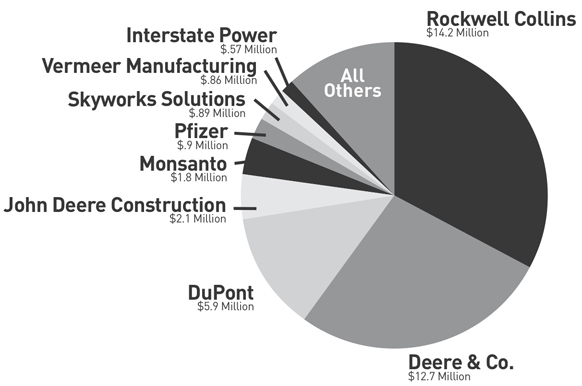New report causes problem for tax credit

Graphic: Kenyon Shafer/Iowa State Daily
Information from Iowa Fiscal Partnership
February 21, 2011
Iowa spending was made more transparent as a report listing that companies received more than $500,000 in Research Activities Tax Credit was made public for the first time Feb. 11.
The tax credit began nationally in the 1980s as a way to subsidize businesses for their advances in research and development. Companies can’t keep their ideas within their own walls, and when those ideas get out, others begin to copy and imitate them, meaning the original company doesn’t profit fully. This credit compensates companies for that outflow of information.
Iowa then started its own version of the credit, but with a unique twist. In Iowa, this credit is completely refundable, which means if a company isn’t paying any tax, it gets a check for the full amount of the credit it received. If the company does pay some tax but the amount of credit it collected is greater, it gets the subtracted amount back in a check from the state treasury, virtually erasing the tax in the first place.
In 2009, Senate File 478 was amended by the legislature, requiring the Iowa Department of Revenue to release an annual report showing those companies claiming $500,000 or more of the credit.
This is where the controversy begins. Opponents argue that Iowa has lost sight of the original purpose of the credit, which was to spur growth and innovation among firms that are struggling with startup costs. Instead, most of the money seems to be going to big corporations that are already making huge profits.
“If you targeted that large number of small businesses to get a little bit of credit, instead of handing out most of the money to five or six very large, very profitable companies, it would be a much better use of public money,” said Peter Fisher, research director of the Iowa Policy Project, a nonprofit, nonpartisan research organization.
The now-annual report released by the Iowa Department of Revenue shows that almost $40 million alone went to only nine large companies, with Rockwell Collins receiving more than $14 million, Deere & Company receiving more than $12 million and DuPont, the mother company of Pioneer, receiving just less than $6 million.
This has caused an outrage because there was a little more than $45 million claimed for calendar year 2010 by corporations. These numbers show that nine companies alone are receiving around 88 percent of the credit.
Also, the state is paying back just more than $43 million of this credit in refunds, meaning that around 95 percent of the credit is refunded back to these corporations.
But companies have fired back saying this credit is what attracted them to Iowa, implying they might look elsewhere if this credit was changed or taken away.
“We actually have more than 100 research locations globally, so we have a lot of opportunity when it comes to expanding our research,” said Bridget Anderson, a spokeswoman for Pioneer. “Tools like the Research Activities Credit help us continue to choose Iowa when making those decisions.”
These companies also emphasize the credit’s role in their hiring needs, which could be an important point for students looking to graduate in the near future.
“Iowa State is an important university for us when we look at where we are bringing in future employees,” Anderson said. “In the research area alone, since 2008, we’ve hired 300 people to work in research jobs here in Iowa, and I’m sure there is a definitely a good representation of that which had come from Iowa State.”
Dave Gosch, a representative for Rockwell Collins, also released a statement that said, “We have 10,000 employees in Iowa with more than half of those working on [research and development] activities — and we currently have plans to hire an additional 400 employees in Iowa this year. Jobs supported by our [research and development] activities account for a payroll of more than $450 million annually in Iowa.”
Critics challenge this argument by saying these companies are too entrenched in Iowa society to ever leave and that there will always be a demand for research jobs whether the credit is available or not.
“That is the most phony of arguments,” said David Swenson, associate scientist of economics. “They are in a race to the death with other companies to produce whatever kinds of innovation they can. [Research and development] is their business. They can’t possibly state without lying that that employment wouldn’t have happened but for the credit.”
















